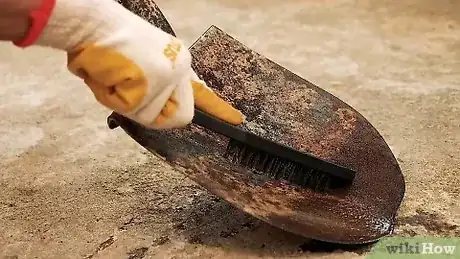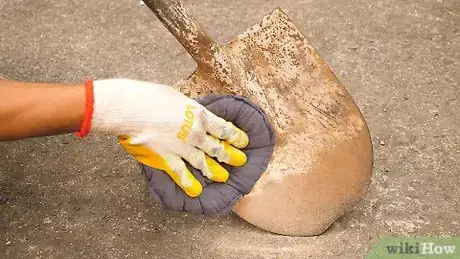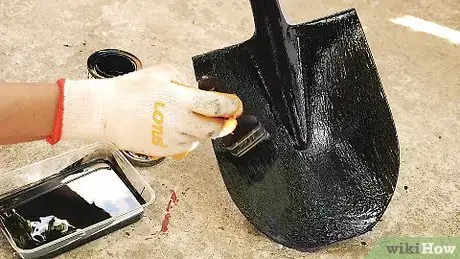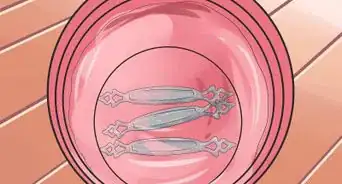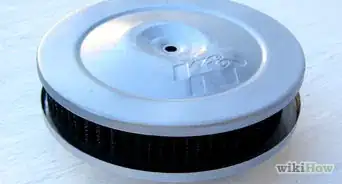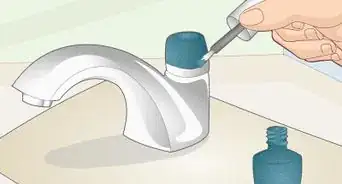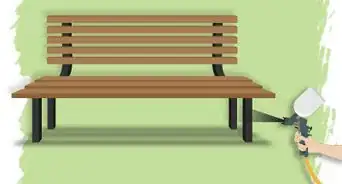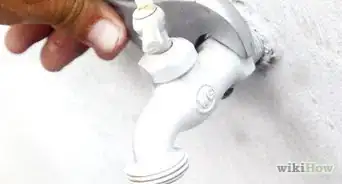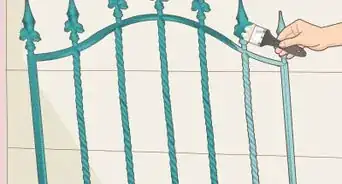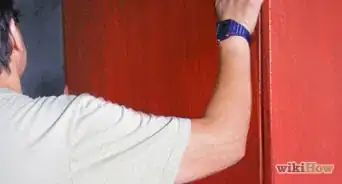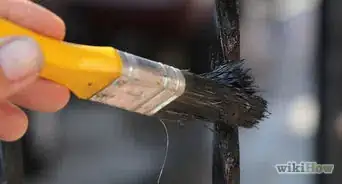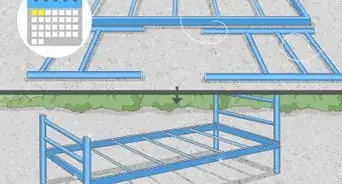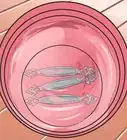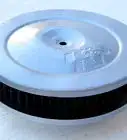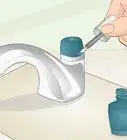This article was co-authored by Patrick Coye and by wikiHow staff writer, Aly Rusciano. Patrick Coye is the owner and operator of Patrick’s Painting & Home Improvement in Alexandria, Virginia. With over 15 years of experience in residential construction, Patrick specializes in painting, wallpaper removal/installation, drywall, staining decks and fences, and kitchen cabinetry painting. To date, Patrick and his team have painted over 2,000 houses and stained over 800 decks. Patrick's Company won a "Top Job" award from the American Painting contractor magazine in 2020.
There are 10 references cited in this article, which can be found at the bottom of the page.
wikiHow marks an article as reader-approved once it receives enough positive feedback. This article received 11 testimonials and 100% of readers who voted found it helpful, earning it our reader-approved status.
This article has been viewed 969,248 times.
Rust, tarnish, and corrosion can make a piece of metal look worn and outdated. But luckily, there’s an easy fix—paint! A couple coats of paint can transform a dull and drab metal piece into something bright and new. All you need is the right paint and a few days to spare. Keep reading to learn how you can paint metal, so it looks as good as new.
Things You Should Know
- Use a wire brush and fine-grit sandpaper to remove rust, dirt, and debris from the metal surface before painting.
- Coat the metal surface in an oil-based primer designed for metals to help your paint job last longer.
- Apply at least 2 coats of a metal paint for a bold and smooth paint job.
Steps
Removing Rust and Dirt
-
1Remove old paint, rust, and dirt from the surface with a wire brush. Rust, dirt, and paint can clump onto a metal surface over time. Use a wire brush to strip unwanted debris from the metal. After a few scrapes, wipe the loosened particles away with a damp rag or cloth. Keep scrubbing and wiping until all the rough clumps are removed.[1]
- If you don’t have a wire brush, use a fine-grit sandpaper or sand block.
- Focus on stripping larger areas with your wire brush, as you can work on the nooks and crannies later when sanding the metal piece.[2]
- Try using a cordless drill with a wire brush attachment to make the process that much quicker.
- Work in a ventilated area and wear gloves and a dust mask when working with paint and rust to protect yourself from harmful particles.[3]
- Consider using a drop sheet to cover your work station to keep it clean.[4]
-
2Rub the surface of the scraped metal with mineral spirits or a degreaser. Wipe away all the remaining paint dust and rust particles with a cloth or rag dipped in a metal degreaser or mineral spirits. This will remove any leftover grime and give you a clean surface to work with.[5]
- Even if the surface looks fairly clean, don't skip this step; otherwise, the paint may not stick to the metal properly.
- If you’re painting something made of galvanized steel, wash it down with white vinegar to break down leftover zinc from the galvanization process. This will help the paint adhere stick to the metal better.[6]
Advertisement -
3Scrub the metal with fine-grit sandpaper until it’s smooth.[7] Sanding the metal before you start painting ensures you get the longest life out of your paint job. Scuffing up the metal smooths it out and creates microscopic ridges the primer and paint can adhere to. After sanding, wipe down your metal with a damp cloth to remove any lingering debris.
Applying Primer and Paint
-
1Apply a coat of an oil-based paint primer to the metal. Pick a primer specific for metal (these are typically oil-based). These adhere best to metal surfaces, helping your paint job last longer. Choose a spray primer or one you brush one—whichever works best for you. Paint or spray the primer on and let it dry for at least 24 hours.[8]
- Always read the instructions on your primer, as there may be specific information on application or drying time.[9]
- If your metal is rusted, apply a zinc-chromate primer before the oil-based primer. This primer resists corrosion and helps protect metal from further rust.[10]
- Primer prepares a surface for paint by creating a smooth surface it can adhere to.[11]
-
2Cover the surface with a metal specific paint and let it dry. Use a bristle paintbrush or a paint roller to paint a thin coat over the surface of the metal. Be careful not to use too much paint as this could cause your paint job to look clumpy. Wait at least 90 minutes for the first coat to dry.[12]
- Oil-based paints work best on outdoor items that will experience lots of weathering. They’re pigmented and water-resistant but can crack and chip easily over time.
- Acrylic-based paints dry fast and their toxic-free formula makes them perfect for indoor use. They’re durable but aren't water-resistant.
- Spray painting metal is another option that can give a smoother, cohesive finish.
- Read the instructions on your paint before painting, as there may be helpful information about application and drying time.[13]
-
3Apply another coat of paint to the metal.[14] If your paint job looks streaky or isn’t as bold as you’d like, add another coat. Follow the brush strokes you used before. Wait between 36 and 48 hours for the paint to cure completely.
- Try to avoid moving your metal piece before it’s completely dried; otherwise, the paint may crack or peel prematurely.
- Consider applying a coat of clear sealant after the metal has dried for added protection. An extra seal can help the paint job last longer, chip less, and be waterproof.
Community Q&A
-
QuestionCan metal mailboxes be painted?
 wikiHow Staff EditorThis answer was written by one of our trained team of researchers who validated it for accuracy and comprehensiveness.
wikiHow Staff EditorThis answer was written by one of our trained team of researchers who validated it for accuracy and comprehensiveness.
Staff Answer wikiHow Staff EditorStaff AnswerYes, metal mailboxes are a great item to paint! With our instructions, you'll be able to turn your mailbox into something that looks brand new.
wikiHow Staff EditorStaff AnswerYes, metal mailboxes are a great item to paint! With our instructions, you'll be able to turn your mailbox into something that looks brand new. -
QuestionI have 2 round metal signs that have a picture painted with acrylic paint on them. What can I put on them to keep the weather from fading them? Would a clear coat sealant work?
 wikiHow Staff EditorThis answer was written by one of our trained team of researchers who validated it for accuracy and comprehensiveness.
wikiHow Staff EditorThis answer was written by one of our trained team of researchers who validated it for accuracy and comprehensiveness.
Staff Answer wikiHow Staff EditorStaff AnswerYes, a coat of a clear sealant will protect your painted metal signs. Opt for one with a gloss finish for a beautiful shine, or try one that's waterproof to keep rain from damaging their pictures.
wikiHow Staff EditorStaff AnswerYes, a coat of a clear sealant will protect your painted metal signs. Opt for one with a gloss finish for a beautiful shine, or try one that's waterproof to keep rain from damaging their pictures. -
QuestionI am painting the iron frame on a metal building. What's the best paint to use?
 wikiHow Staff EditorThis answer was written by one of our trained team of researchers who validated it for accuracy and comprehensiveness.
wikiHow Staff EditorThis answer was written by one of our trained team of researchers who validated it for accuracy and comprehensiveness.
Staff Answer wikiHow Staff EditorStaff AnswerOpt for an oil-based paint that's specifically made for metal, as this will adhere to the iron frame the best.
wikiHow Staff EditorStaff AnswerOpt for an oil-based paint that's specifically made for metal, as this will adhere to the iron frame the best.
Things You’ll Need
- Rag or cloth
- Wire brush
- Fine-grit sandpaper
- Gloves and dust mask
- Drop sheet (optional)
- Metal degreaser or mineral spirits
- Oil-based metal paint primer
- Metal paint
- Paintbrush or paint roller
References
- ↑ https://youtu.be/8JxHFDUtSHI?t=111
- ↑ Patrick Coye. Painting Specialist. Expert Interview. 22 July 2020.
- ↑ Patrick Coye. Painting Specialist. Expert Interview. 22 July 2020.
- ↑ Patrick Coye. Painting Specialist. Expert Interview. 22 July 2020.
- ↑ https://youtu.be/8JxHFDUtSHI?t=156
- ↑ https://indmetalstrap.com/paint-galvanized-steel-4-easy-steps/
- ↑ Patrick Coye. Painting Specialist. Expert Interview. 22 July 2020.
- ↑ https://youtu.be/8JxHFDUtSHI?t=175
- ↑ https://youtu.be/7qm1t5DyW50?t=128
- ↑ http://www.paintcenter.org/rj/jul02k.cfm
- ↑ Patrick Coye. Painting Specialist. Expert Interview. 22 July 2020.
- ↑ https://www.forbes.com/advisor/home-improvement/time-for-paint-to-dry/
- ↑ https://youtu.be/7qm1t5DyW50?t=147
- ↑ https://youtu.be/8JxHFDUtSHI?t=277
About This Article
To paint metal, first put on a dust mask and some thick gloves. If you can, take your metal surface outside. Otherwise, put a drop cloth underneath it. Then, scrub the metal with coarse sandpaper to remove any rust or old paint. If you item is rusty, apply a rust converter and scrub the metal with a wire brush if the rust won't come off with just the sandpaper. Wipe the metal with a damp cloth to get any dust or debris off of the surface, then let it air dry. Next, fill a paint tray with metal primer, and use a brush or roller to apply an even coat to the metal surface. Wait at least 24 hours for the primer to dry. Now, fill a clean paint tray with an oil-based paint designed for metal. Apply the paint using a brush or roller, starting with the exterior edges to paint the trim before working your way to the easier, flatter sections. Finally, wait at least 12 hours to let the paint dry before handling the metal. For textured metals, use a spray primer instead of liquid primer. Hold the can 6-8 inches (15-20 cm) away from your sanded metal and coat the entire surface. Wait 24 hours for the primer to dry before spray painting the metal with your top coat. To learn about what type of paint to use if the metal is rusty or damaged, keep reading the article!
